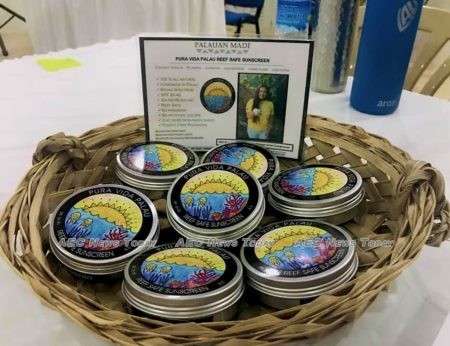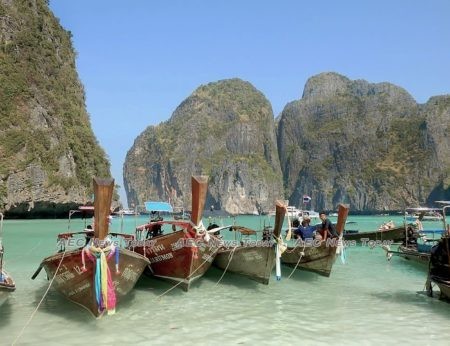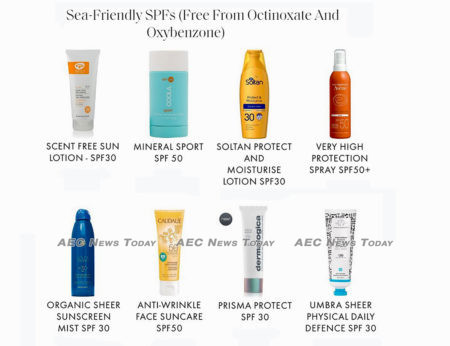Palau is setting the environmental protection bar high for other countries as it kicks off the new year, implementing a ban on “reef-toxic” sunscreens.
From January 1, the sale and use of sunscreen products that contain chemicals such as Oxybenzone, Ethyl paraben, Octinoxate, Butyl paraben, Octocrylene, 4-methyl-benzylidene camphor, Benzyl paraben, Triclosan, Methyl paraben, and Phenoxyethanol is prohibited in the western Pacific archipelago of over 500 islands.
The ban was signed into law late last year along with a slew of environmental measures designed to protect the country’s United Nations Educational, Scientific and Cultural Organisation (Unesco) World Heritage site coral reefs from sunscreen pollution.
According to the International Coral Reef Initiative (ICRI) the 10 ingredients were “known environmental pollutants – incredibly toxic to juvenile stages of many wildlife species, including corals, fish, macroalgae, and even people”.
Love and respect the environment

Palau’s President, Tommy E. Remengesau Jr., who signed off on The Responsible Tourism Education Act of 2018, told AFP news agency “we have to love and respect the environment because the environment is the nest of life, and without it nobody in Palau can survive”.
Under the law reef-toxic sunscreen will be confiscated, with anyone selling and/or importing sunscreens containing the banned chemicals for sale subject to a fine of up to $1,000.
Speaking with the Island Times, President Remengesau said that the ban was needed to “let the ocean heal” after years of mass commercial fishing in the Pacific has seen stocks of some species, such as bluefin tuna, fall to critical levels.
“When science tells us that a practice is damaging to coral reefs, to fish populations, or to the ocean itself, our people take note and our visitors do too”, Mr Remengesau said.
The ban doesn’t mean that visitors to Palau need go unprotected against UV rays. Mr Remengesau said that there are other environmentally-friendly sunscreens in Palau that the government will promote the use of, including Pura Vida Palau, a locally-made sunscreen product by a young Palauan entrepreneur.
Exclusive rights to fish
Along with the reef-toxic sunscreen ban came a new marine sanctuary, closing 80 per cent of Palau’s exclusive economic zone (EEZ) to fishing — a total of 500,000 square kilometres (about 193,000 square miles).
The legislation requires foreign vessels working in the limited fishing area pay export tax on their catch, with all fish caught in the EEZ needing to be landed in Palau, where local fish merchants have the first choice before any fish are exported.
The latest legislation is in keeping with a bold step the island nation took in 2017, having tourists sign an ‘eco-pledge’ before visiting stating “I vow to tread lightly, act kindly and explore mindfully”.
| Dr Andrew Negri: “there may be no actual benefit” Video ABC News (Australia) |
Over a dozen scientific papers have demonstrated that Oxybenzone is highly toxic to marine life, especially coral, damaging its DNA and deforming and killing juvenile coral. However, Dr Andrew Negri from the Australian Institute of Marine Science (AIMS) says ‘there may be no actual benefit’ from the ban.
He says that despite good intentions, little is being done to produce alternative sunscreens.
While Palau is the first nation to implement such a bold environmental policy, other popular tourist destinations in Asean are also taking an increasing notice of the harm unfettered tourism and consumerism can do to the environment.
More help for the environment across Asean
In June 2018 Thai authorities banned boat access to Maya Bay, one of the Phi Phi islands in the Andaman Sea made famous in Leonardo DiCaprio’s 2000 movie The Beach”, in a bid to reverse the catastrophic ecological damage bing inflicted by excessive tourism.
Although the marine ecosystem has greatly improved over the 18 months, Thailand’s Department of National Parks, Wildlife and Plant Conservation (DNPWPC), recently announced that the bay will remain closed for another two years to allow additional recovery.
More than 22,000 individual corals of nine species have been propagated in the bay since 2018.

In the Philippines the cesspool-like waters surrounding Boracay Island saw President Rodrigo Duterte order the island closed in 2018 and extensive infrastructure work undertaken, including the demolition of many polluting and unlicensed businesses.
When it reopened in October 2018 after a six-month-long overhaul under armed military guard, things were radically different. The island’s once famous beach parties were banned, along with the use of kerosene gas, and gas lamps along the beach, firecrackers, and single-use plastic bags (See: The new Boracay: not how you remember it (video)).
Plastic bag threat to Asean ecosystems
Single-use plastics pose a significant threat to marine ecosystems throughout Southeast Asia, where Indonesia, the Philippines, Thailand, and Vietnam (together with China) produce up to 60 per cent of the plastic waste in the world’s oceans.
On January 1 Thailand became the latest Asean country to ban single-use plastic bags, more than two years ahead of a plastic waste management road map approved in April last year.
In 2019 the Thailand government and retailers launched a campaign aimed at a complete ban on single-use plastic bags by 2021. The campaign has since seen single-use plastic bag use cut by more than two billion, or some 5.7 million kilograms of plastic worth about Bt400 million ($13.235 mln).

Coinciding with the launch of the ban on Wednesday (Jan 1) Thailand’s Minister of Natural Resources and Environment (NREM), Varawut Silpa-Archa, told reporters that Thais consume up to 3,000 single-use plastic bags each per year. On two separate occasions last year a deer and a baby dugong were choked to death by plastics.
In June 2019 the island of Bali became the first Indonesian province to officially ban all single-use plastic bags, straws, and polystyrene, while in Cambodia customers have had to either pay KHR400 ($0.10) for a plastic bag at convenience stores, or supply their own since April, 2018.
In the Philippines President Duterte has also sought to ban single-use plastics, a proposal that has gained support from members of the House of Representatives, while Vietnam is mulling plans to phase out the use of single-use plastic products by 2025.
Feature video Sky News Australia
Related:
- Palau bans ‘reef-toxic’ sunscreen (AFP)
- Thailand kicks off 2020 with plastic bag ban (Reuters)
- Miracle of Maya Bay: how Thai paradise island wrecked by tourism has staged an incredible recovery in marine life (South China Morning Post)
Stella-maris Ewudolu
Between November 2010 and February 2012 she was a staff writer at Daylight Online, Nigeria writing on health, fashion, and relationships. From 2010 – 2017 she worked as a freelance screen writer for ‘Nollywood’, Nigeria.
She joined AEC News Today in December 2016.
Latest posts by Stella-maris Ewudolu (see all)
- Zoonotic crossover fear sees Vietnam ban (almost) all wildlife trade (video) – July 26, 2020
- Job & revenue losses: COVID-19 to hurt Asean airlines the most – July 24, 2020
- Philippines morning news for July 24 – July 24, 2020
- Philippines morning news for July 23 – July 23, 2020

